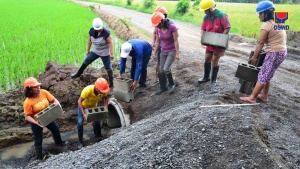
In line with the celebration of the International Women’s Day on Friday (March 8), the Department of Social Welfare and Development (DSWD) has expressed its gratitude to the 1.5 million women-volunteers of its community driven development (CDD) program, the Kapit-Bisig Laban sa Kahirapan – Comprehensive and Integrated Delivery of Social Services (KALAHI-CIDSS), for their dedicated participation in the successful implementation of the program.
“Malaki ang tiwala ng DSWD sa lakas ng mga kababaihan. Ang kanilang lakas ang nagsisilbing gabay patungo sa isang mapagpalaya, mapagkalinga at progresibong lipunan,” DSWD Asst. Secretary for Strategic Communications Romel Lopez, who is also the agency’s spokesperson, said.
(The DSWD has great confidence in the strength of women. Their strength serves as a guide toward a more liberating, caring, and progressive society.)
“Isang mahalagang patunay rito ay ang pakikiisa ng mga kababaihan sa mga programa ng ating ahensya upang patuloy na umunlad ang kanilang mga pamayanan. Katulad na lamang ng KALAHI-CIDSS na 63 porsyento ng mga volunteers ay mga kababaihan,” Asst. Sec. Lopez added.
(An important proof of this is women’s participation in our agency’s programs so that their communities will continue to develop. In KALAHI-CIDSS, 63 percent of the volunteers are women.)
As of February, the KALAHI-CIDSS has more than 1.5 million women volunteers across all program modalities.
Among them is Mennie A. Bongcay, a 72-year-old KALAH-CIDSS volunteer from Barangay New Poblacion, Cabusao, Camarines Sur.
According to Mennie, she did not allow her gender or age to become a hindrance from actively participating in the community sub-project implementation in their barangay.
“Para makatulong at matuto pa din sa iba’t-ibang aspeto ng paggawa ng proyekto ng barangay kahit na nasa ganitong edad na ako, na 72 years old,” Mennie explained
(To help and to learn the different aspects of conducting a project in our barangay even though I’m at this age, 72 years old.)
Because of her eagerness to help their community, she was able to take on the role of a Project Implementation Team (PIT) Head in their barangay.
“Aking napagtanto na sa KALAHI-CIDSS pala ay walang pinipili . Kahit hindi ka nag-aral, kahit hindi ka nakapagtapos, kahit wala kang hanapbuhay, kahit ano ang sexual orientation at higit sa lahat walang pinipiling edad. Ang mahalaga dito ay ang partisipasyon at dedikasyon,” she shared.
(I realized that KALAHI-CIDSS does not choose who will be the community volunteer. Even if you did not go to school, you did not graduate, you did not have a job, no matter what your sexual orientation was, and most especially there is no age limit. What is important is the participation and dedication.)
Despite facing criticisms, Mennie was able to effectively carry out her tasks and learned new skills to help her fellow community volunteers which resulted in the successful construction of a pathway and the establishment of a Public Address System in their barangay.
Currently, she is actively engaged in another sub-project to construct a day care center in their community.
“Gaya ni Aling Mennie ang partisipasyon ng mga women volunteers sa pamumuno at pamamalakad ng mga proyekto ng KALAHI-CIDSS ay isang tanda ng malaking ambag nila patungo sa kaunlaran at pagbabago ng kanilang mga pamayanan,” said Asst. Sec. Lopez.
(Like Aling Mennie, the participation of women volunteers in the leadership and management of KALAHI-CIDSS projects is a sign of their great contribution towards the development and change of their communities.)
“Lubos ang pasasalamat ng DSWD sa aming mga kababaihang volunteers. Makakaasa po kayo na patuloy naming pagbubutihin ang aming mga programa at serbisyo upang mapalakas pa at mabigyan kayo ng mas maraming oportunidad para lumago ang inyong mga pamayanan,” Asst. Sec. Lopez ended.
(DSWD is very grateful to our women volunteers. Rest assured that we will continue to improve our programs and services to strengthen and give you more opportunities to help your communities to grow.)
KALAHI-CIDSS is a poverty alleviation program that utilizes the CDD approach to empower poor communities and improve their quality of life.
The program focuses on enhancing local governance, promoting social inclusion, and fostering sustainable development through active community participation. #


